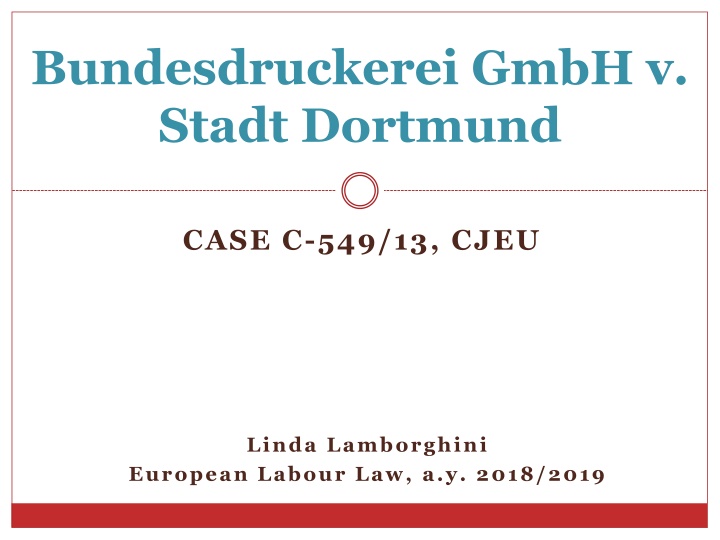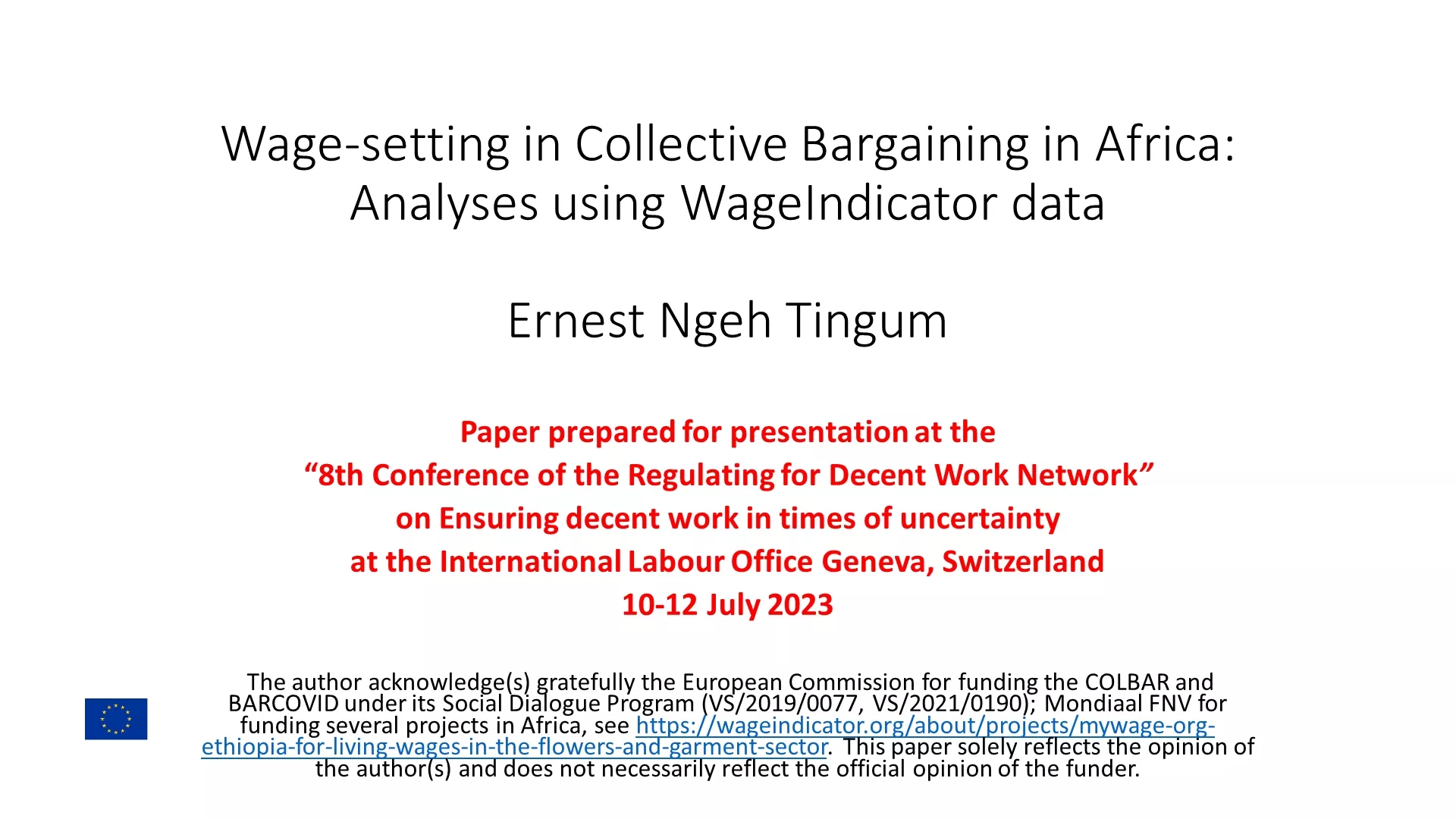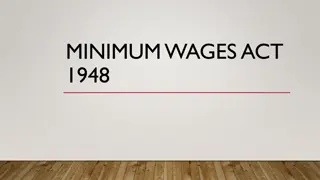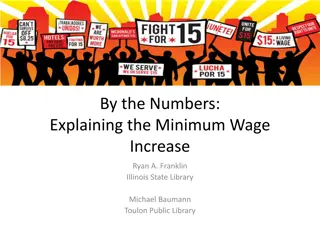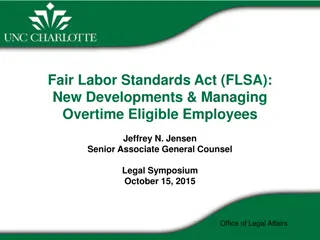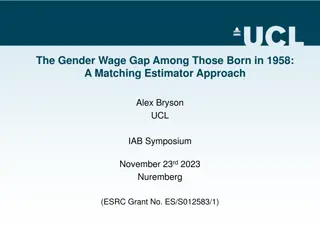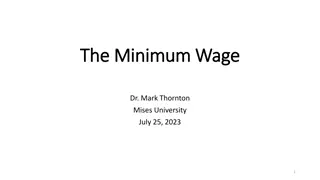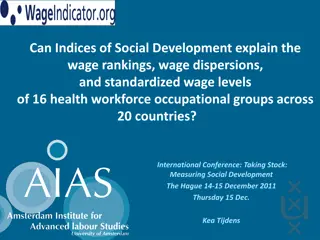Dispute Over Minimum Wage in Public Contracting
In a case involving a public contract issued by the city of Dortmund, a dispute arose over the imposition of a minimum hourly wage on contractors and subcontractors, raising questions about compliance with EU law and restrictions on the freedom to provide services across borders.
Download Presentation

Please find below an Image/Link to download the presentation.
The content on the website is provided AS IS for your information and personal use only. It may not be sold, licensed, or shared on other websites without obtaining consent from the author.If you encounter any issues during the download, it is possible that the publisher has removed the file from their server.
You are allowed to download the files provided on this website for personal or commercial use, subject to the condition that they are used lawfully. All files are the property of their respective owners.
The content on the website is provided AS IS for your information and personal use only. It may not be sold, licensed, or shared on other websites without obtaining consent from the author.
E N D
Presentation Transcript
Bundesdruckerei GmbH v. Stadt Dortmund CASE C-549/13, CJEU Linda Lamborghini European Labour Law, a.y. 2018/2019
Facts In May 2013, the city of Dortmund (Germany) issued a call for tenders, at EU level, for a public contract concerning the digitalisation of documents and the conversion of data for the urban-planning service of that city. Point 2 of the special conditions of tendering documents included a standard form to be signed by the contractor, by which he agreed to pay his employees a minimum hourly wage ( 8,62) and to require his subcontractors also to comply that minimum wage. The minimum wage respected the TvgG NRW (Gesetz ber die Sicherung von Tariftreue und Sozialstandards sowie fairen Wettbewerb bei der Vergabe ffentlicher Auftr ge), a law of the Land of North Rhine- Westphalia that concerns compliance with collective agreements, social norms and fair competition in the award of public contracts.
Facts In June 2013, Bundesdruckerei, an undertaking, sent a letter to Stadt Dortmund. Bundesdrukerei wanted to inform the city that, if it were awarded the contract, contract would be performed exclusively in Poland, by a subcontractor established in that State. Polish subcontractor wouldn t be able to observe the minimum wage imposed by TvgG NRW, since such a minimum wage was not provided for by collective agreements or by the law of that Member State. Moreover, according to Bundesdruckerei s opinion, the payment of such a minimum wage was not usual in the light of the general conditions in living there. the services under that
Facts Bundesdruckerei asked Stadt Dortmund to confirm to it that point 2 of the tendering documents would not be applied to the subcontractor which it intended to engage. Bundesdruckerei suspected a violation of the law governing public procurement. In August 2013, Stadt Bundesdruckerei that it couldn t accede to its request because, as a contracting authority of the Land of North- Rhine Westphalia, it was obliged to respect and to apply the provision of the TVgG NRW. Dortmund replied to
Facts Bundesdruckerei decided to bring an action before the Public Procurement Board Arnsberg regional government (Vergabekammer bei der Bezirksregierung Arnsberg), in order to oblige the Stadt Dortmund to change point 2 of the tendering documents, meaning that the special conditions would not apply to subcontractors established in another MS, in this case Poland. attached to the
Views of the parties Stadt Dortmund Bundesdruckerei Suspected violation of article 56 TFEU: unjustified restriction on the freedom to provide services. Additional economic burden which make less attractive the cross-border supply of services. The obligation to pay the minimum hourly wage, based on German labour law, is compatible with EU law. That obligation could be a special condition relating to the performance of the contract, according to Article 26 of Directive 2004/18.
Facts The public procurement board submitted a request to the CJEU for a preliminary ruling. Public procurement board s view: the obligation of point 2 of tendering documents would constitute a restriction on the freedom to provide services and indirect discrimination with respect to tenderers who supply their services in other MS, with very different cost structures. In the opinion of the public procurement board, that restriction cannot be justified by the overriding reason in the public interest which is represented by the protection of workers. (par. 18) The minimum wage is above and beyond to what is required in order to guarantee reasonable remuneration in the light of the cost of living of Poland. Moreover, public interest in the protection of workers may already be taken into account by Polish legislation.
Question asked before the Court for a preliminary ruling Do article 56 TFEU and article 3 of Directive 96/71/EC preclude national impose to tenderers and their subcontractors to pay a minimum wage to workers, even if the subcontractor is established in another Member State and employees services exclusively in the subcontractor s home country? legislation to carry out
Legal context Art. 56 TFEU freedom to provide services Directive 96/71/EC posting of workers Article 1 Article 3 Directive 2004/18/EC special national conditions Paragraph 4 of the Law of the Land of North-Rhine Westphalia compliance with collective agreements, social norms and fair competition in the award of public contracts
EU law Article 56 TFEU (ex Article 49 TEC) Within the framework of the provisions set out below, restrictions on freedom to provide services within the Union shall be prohibited in respect of nationals of Member States who are established in a Member State other than that of the person for whom the services are intended. The European Parliament and the Council, acting in accordance with the ordinary legislative procedure, may extend the provisions of the Chapter to nationals of a third country who provide services and who are established within the Union.
EU law Article 1 of Directive 96/71/EC, entitled Scope provides: 1. This Directive shall apply to undertakings established in a Member State which, in the framework of the transnational provision of services, post workers, in accordance with paragraph 3. to the territory of a Member State. 2. (...) 3. This Directive shall apply to the extent that the undertakings referred to in paragraph 1 take one of the following transnational measures: a) Post workers to the territory of a Member State on their account and under their direction, under a contract concluded between the undertaking making the posting and the party for whom the services are intended, operating in that Member State, provided there is an employment relationship between the undertaking making the posting and the worker during the period of the posting; or b) Post workers to an establishment or to an undertaking owned by the group in the territory of a Member State, provided there is an employment relationship between the undertaking making the posting and the worker during the period of posting; or c) Being a temporary employment undertaking or placement agency, hire out a worker to a user undertaking established or operating in the territory of a Member State, provided there is an employment relationship between the temporary employment undertaking or placement agency and the worker during the period of posting.
EU law Article 3 of Directive 96/71/EC, entitled Terms and conditions of employment provides in paragraph 1: Member State shall ensure that, whatever the law applicable to the employment relationship, the undertakings referred to in article 1 guarantee workers posted to their territory the terms and conditions of employment covering the following matters which, in the Member State where the work is carried out, are laid down: By law, regulation or administrative provision, And/or By collective agreements or arbitration awards which have been declared universally applicable within the meaning of paragraph 8, insofar as they concern the activities referred to in the Annex: ... (c) The minimum rates of pay, including overtime rates; this point does not apply to supplementary occupational retirement pension schemes; ... For the purposes of the Directive, the concept of minimum rates of pay referred to in paragraph 1(c) is defined by the national law and/or practice of the Member State to whose territory the worker is posted.
EU law Article 26 of Directive 2004/18/EC Parliament and of the Council on the coordination of procedures for the award of public works contracts, public supply contracts and public service contracts, entitled Conditions for performance of contracts , provided, before that directive was repealed by Directive 2014/24/EU of the European Parliament and of the Council of 26 February 2014 on public procurement and repealing Directive 2004/18 : Contracting authorities may lay down special conditions relating to the performance of a contract, provided that these are compatible with Community law and are indicated in the contract notice or in the specifications. The conditions governing the performance of a contract may, in particular, concerns social and environmental considerations. of the European
German law Paragraph 4 of the Law of the Land of North RhineWestphalia on compliance with collective agreements, social norms and fair competition in the award of public contracts (Gesetz ber die Sicherung von Tariftreue und Sozialstandards sowie fairen Wettbewerb bei der Vergabe ffentlicherAuftr ge), of 10 January 2012 ( the TVgGNRW ) provides: (1) Public service contracts, the performance of which comes within the scope of application of the law on the posting of workers, (2) Public contracts in the field of public transportation of passengers by road and rail (3) Public service contracts which are not covered by Paragraph 4(1) and (2) may be awarded only to undertakings which, at the time of the submission of the tender, have agreed in writing, by means of a declaration made to the contracting authority, to pay their staff , for the performance of the service, a minimum hourly wage of at least EUR 8.62. The undertakings shall, in their declarations, state the nature of the commitment adopted by their undertaking in the context of the collective agreement and the minimum hourly wage which will be paid to the staff engaged for the performance of the services. The amount of the minimum hourly wage may be adapted in accordance with Paragraph 21, by means of a regulation adopted by the Ministry of Labour.
Substance This case doesn t concern posting of workers: the situation isn t covered by one of the 3 transnational measures referred to article 3(1) of Directive 96/71. Instead, it concerns a subcontractor carry out the services covered by the contract exclusively in country . (par. 26) The case is relating to the freedom to provide services: German public procurement board asked if article 56 TFEU precludes the application of German legislation which impose to a subcontractor, established in another MS, to pay a minimum wage fixed by that legislation. situation in which the the subcontractor s home
Substance According to the Court s case-law, the imposition, under national legislation, of a minimum wage on subcontractors of a tenderer which are established in another MS, constitutes economic burden that may prohibit, impede or render less attractive the provision of their services in the host Member State . (par. 30) This measure is capable restriction within the meaning of article 56 TFEU. (par. 30) an additional of constituting a
Substance CJEU noted a possible justification for special condition of tendering documents: there is an objective of protecting employees, expressly referred in the draft legislation that culminated in the adoption of TvgG- NRW, which is to ensure a reasonable wage for employees, in order to avoid both social dumping and the penalisation of competing undertakings that grant a reasonable wage to their employees. As the Court has already affirmed, this measure is not appropriate for achieving that objective if there is no information to suggest that employees working in the private sector are not in need of the same wage protection as those working in the context of public contracts . (par. 32)
Substance The national legislation at issue in the main proceedings (...) appears disproportionate . (par.33) The minimum wage and the national legislation that impose it go beyond what is necessary to protect workers: the fixed wage bears no relation to the cost of living in Poland and, for that reason, prevents established in that Member State from deriving a competitive differences between the respective rates of pay. subcontractors advantage from
Substance The wage protection measure at issue in the main proceedings also cannot be justified in the light of the objective of stability of social security system. It hasn t been claimed, and does not appear tenable to assert, that the application of that measure to the Polish employees concerned is necessary in order to avoid a risk of seriously undermining the balance of German social security system. If those employees did not receive a reasonable wage and were consequently forced to have recourse to social security in order to ensure a minimum level of purchasing power, it would be to Polish social assistance that they would a right. Such a consequence would clearly not affect security system. (par.35) the German social
Solution provided by the CJEU In the light of all of the foregoing, the answer to the question referred is that, in a situation such as that at issue in the main proceedings, in which a tenderer intends to carry out a public contract by having recourse exclusively to workers employed by a subcontractor established in a Member State other than that to which the contracting authority belongs, precludes the application of legislation of the Member State to which that contracting authority belongs which requires that subcontractor to pay those workers a minimum wage fixed by that legislation. (par. 36) Article 56 TFEU
Conclusions In the public sector there s a minimum wage protection, but it doesn t exist in the private sector. Economic freedom of undertakings seems to prevail over the protection of workers. CJEU doesn t concern existing in the EU, thereby increasing the social dumping. No harmonization. about wage differences
